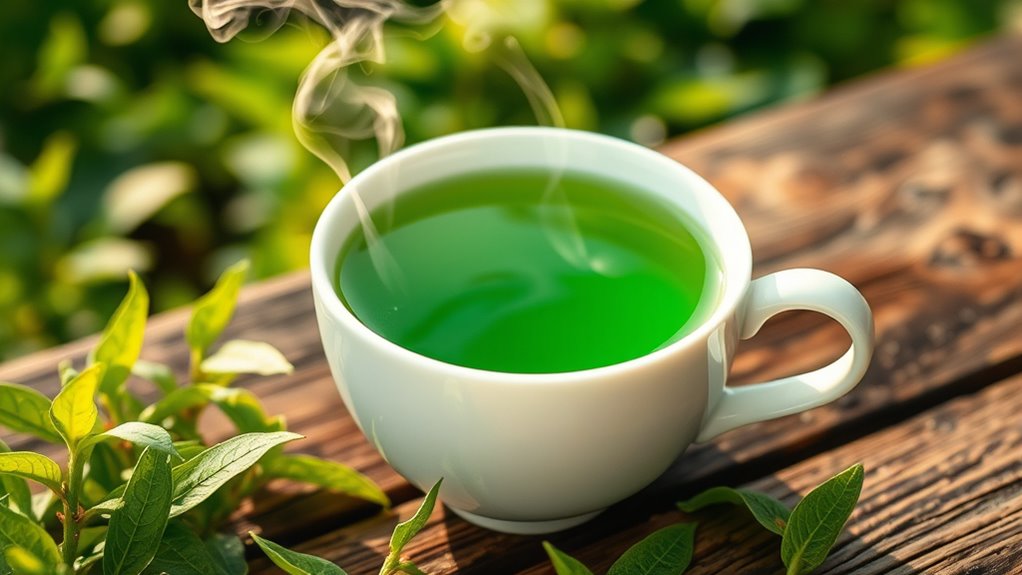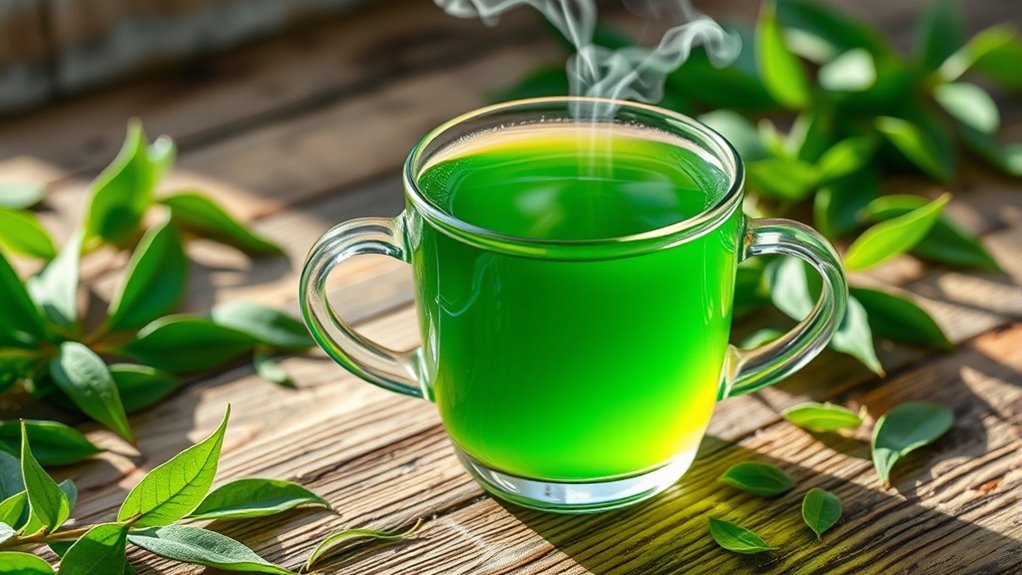Green tea can modestly boost your metabolism thanks to antioxidants like catechins and caffeine, which help increase energy expenditure and fat oxidation. While these effects are small, they can add up over time, especially when combined with a healthy diet and regular exercise. It’s not a magic fix, but it’s a supportive addition to your wellness routine. If you keep exploring, you’ll discover how to make green tea work best for you.
Key Takeaways
- Green tea contains antioxidants like catechins, which may modestly boost fat oxidation and metabolic rate.
- The caffeine in green tea can temporarily increase energy expenditure and alertness.
- Evidence suggests green tea supports overall metabolic health when combined with healthy habits.
- Its effects on metabolism are mild and vary among individuals; green tea is not a standalone weight-loss solution.
- Regular consumption helps maintain subtle metabolic benefits, but significant changes require lifestyle changes.

Have you ever wondered if drinking green tea can boost your metabolism? It’s a common question, especially if you’re looking for simple ways to support weight management. Green tea is often praised for its health benefits, but does it really help your body burn calories more efficiently? One of the main reasons people turn to green tea is its rich antioxidant properties. These antioxidants, particularly catechins like EGCG, are believed to promote fat oxidation and improve metabolic rate. When you drink green tea, you’re not just sipping a warm beverage; you’re potentially giving your body a boost of powerful compounds that can combat oxidative stress and support overall health. Additionally, the bioactive compounds in green tea may influence metabolic pathways that regulate energy expenditure. However, the precise impact on metabolism is often debated, and understanding the role of caffeine effects is essential. Green tea contains caffeine, a natural stimulant that can temporarily increase alertness and energy expenditure. When you consume green tea, the caffeine acts on your nervous system, stimulating your central nervous system and boosting your metabolic rate slightly. This means your body might burn a few more calories than it normally would, especially during physical activity. But keep in mind, the caffeine content in green tea is lower than in coffee, so the effects are milder but still noticeable for some people. If you’re sensitive to caffeine, you might experience more pronounced effects, such as increased heart rate or jitteriness, which could also influence your metabolism indirectly. Drinking green tea regularly can help maintain these subtle effects, but it’s unlikely to produce dramatic changes on its own. It’s also worth noting that the antioxidant properties in green tea may help improve overall metabolic health by reducing inflammation and supporting cellular functions. These compounds can help your body recover from oxidative damage caused by daily stress and environmental toxins, potentially leading to more efficient energy use over time. Combining green tea with a balanced diet and regular exercise will yield better results than relying solely on the tea itself. So, while green tea does contain antioxidants that support your health and caffeine effects that can give your metabolism a slight lift, it’s not a miracle cure for weight loss. Instead, think of it as a helpful addition to a healthy lifestyle. Drinking green tea may give you a small edge by increasing your calorie burn slightly and supporting overall metabolic health, but it’s up to you to make the right choices in diet and activity to see real results. Ultimately, incorporating green tea into your routine can be a smart move, but don’t expect it to do all the work for you.
Frequently Asked Questions
Can Green Tea Replace Weight Loss Medications?
You can’t rely on green tea to replace weight loss medications entirely. While herbal alternatives like green tea are popular dietary supplements that may support metabolism, they aren’t a substitute for medical treatments. For effective weight management, combine healthy eating, exercise, and professional advice. Green tea can be a helpful supplement, but it shouldn’t be the sole strategy—consult your healthcare provider for personalized guidance.
How Much Green Tea Should I Drink Daily?
Imagine waking up to a warm cup of green tea, feeling the gentle boost of calorie burning and antioxidant benefits. You should aim for about 3 to 4 cups daily, which provides enough antioxidants and supports metabolism without overdoing it. Drinking consistently helps maximize these benefits, but avoid excess to prevent side effects. Balance your intake, enjoy the soothing ritual, and let green tea be a small yet effective part of your health routine.
Does Green Tea Have Any Side Effects?
You might experience side effects from green tea, especially if you have green tea allergies or caffeine sensitivity. Allergies can cause symptoms like headaches, rashes, or stomach issues, while caffeine sensitivity may lead to insomnia, jitters, or increased heart rate. It’s best to moderate your intake and pay attention to how your body reacts. If you notice adverse effects, consider reducing your consumption or consulting a healthcare professional.
Is Green Tea Suitable for Pregnant Women?
Pregnancy safety is key when considering green tea, as it contains caffeine and antioxidants that might affect your baby. You should consult your healthcare provider before drinking it regularly. If you’re looking for herbal alternatives, options like ginger or peppermint teas are generally safer during pregnancy. Always prioritize professional advice to guarantee both your health and your baby’s well-being.
Can Green Tea Improve Overall Energy Levels?
Imagine feeling more energized after a cup of green tea—it’s possible! Green tea contains caffeine, which can give you a gentle boost, and its antioxidant benefits help combat fatigue. For example, someone replacing coffee with green tea often reports steadier energy throughout the day. While individual responses vary, incorporating green tea into your routine might improve overall energy levels without the jitters or crashes associated with higher caffeine beverages.
Conclusion
So, maybe it’s no coincidence that sipping green tea often coincides with moments of motivation or new beginnings. While it might not be a magic bullet for boosting your metabolism, enjoying it could remind you to stay mindful of your health choices. Sometimes, small habits like this gently steer us toward better routines without us even realizing. After all, it’s the little things—like that unexpected sip—that can quietly make a difference in your journey.









